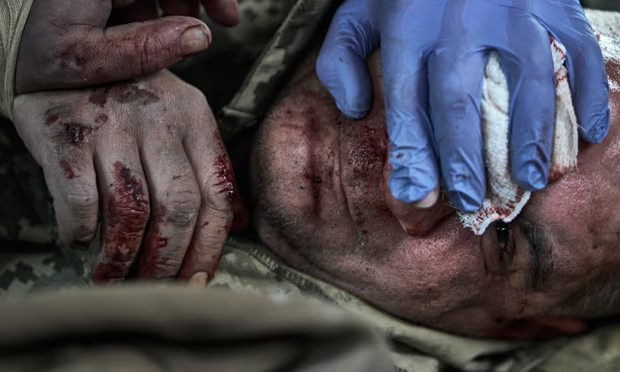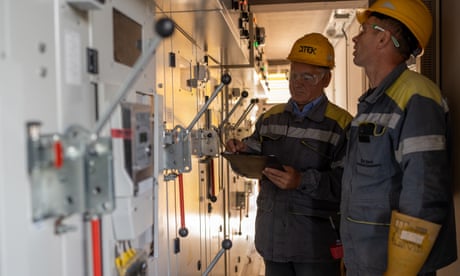Russia shells 100 settlements within 24 hours as top Ukrainian commander warns war is entering a new phase
Russia has shelled more than 100 settlements over the last 24 hours – more than in any single day so far this year – Ukraine has said as its commander-in-chief warns the war with Russia is moving towards a new stage of static and attritional fighting, a phase that could allow Moscow to rebuild its military power.
It comes amid reports that North Korea has supplied Russia with two months’ worth of artillery shells.
The Russians have fired millions of shells on cities, towns and villages since invading in February 2022, reducing several settlements to rubble across the eastern part of Ukraine.
“Over the last 24 hours, the enemy shelled 118 settlements in 10 regions,” Igor Klymenko, the Ukrainian interior minister, wrote on social media.
“This is the highest number of cities and villages that have come under attack since the start of the year.”
Ukraine also reported a Russian attack on an oil refinery in Kremenchuk, a central industrial city. There were no casualties but it took almost 100 firefighters several hours to put out the resulting fire, Klymenko said. The overnight shelling in the north-eastern Kharkiv region killed one person, and another was killed in the southern Kherson region, local officials said.

Ukraine’s government and the west fear Russia will escalate its attacks on Ukraine’s energy infrastructure ahead of the cold winter, as it did last year.
Citing intelligence information, a South Korean lawmaker said on Wednesday that North Korea had provided Russia with more than a million badly needed artillery shells in exchange for advanced Russian technologies that would strengthen Kim’s nuclear-armed military.
In an article for the Economist published on Wednesday, Gen Valerii Zaluzhnyi said his army needed key new military capabilities and technological innovation to break out of the new phase of the war, now in its 21st month.
Using stark language, he described risks of prolonged, attritional fighting: “This will benefit Russia, allowing it to rebuild its military power, eventually threatening Ukraine’s armed forces and the state itself.”
His article comes almost five months into a major Ukrainian counteroffensive that has not made a serious breakthrough against heavily mined Russian defensive lines. Fighting is expected to slow as the weather worsens.
“Just like in the first world war we have reached the level of technology that puts us into a stalemate,” Zaluzhnyi was quoted as saying in an interview published alongside his article.

The article singled out Russia’s air power advantage as a factor that made advancing harder and called for Ukraine to conduct massive drone strikes to overload Russia’s air defences.
“Basic weapons, such as missiles and shells, remain essential. But Ukraine’s armed forces need key military capabilities and technologies to break out of this kind of war. The most important one is air power,” he wrote.
He called it a priority for Ukraine to build up its reserve forces despite noting it had limited capacity to train them inside the country and highlighting gaps in legislation that allowed people to evade service.
“We are trying to fix these problems. We are introducing a unified register of draftees, and we must expand the category of citizens who can be called up for training or mobilisation.
“We are also introducing a ‘combat internship’, which involves placing newly mobilised and trained personnel in experienced frontline units to prepare them.”

As Ukraine hopes for better technology and additional funding from the west, South Korea’s national intelligence service (NIS) said the North had been sending shells to Russia using ships and other transport means since early August. Those shells would roughly amount to two months’ supply for the Russians, Yoo Sang-bum said. Yoo attended a closed-door briefing on Wednesday with intelligence officials.
NIS officials didn’t immediately respond to a request to confirm Yoo’s account of the meeting. The agency has a mixed record on tracking developments in North Korea, which is made difficult by Pyongyang’s stringent control of information. But North Korea and Russia have been actively boosting the visibility of their partnership in the face of separate, deepening confrontation with the US. Both Pyongyang and Moscow have denied US and South Korean claims that the North has been supplying arms to Russia.
There are concerns in South Korea that North Korea could receive sensitive Russian technologies that would enhance the threat of Kim’s nuclear weapons and missiles programme. But the NIS said it was more likely that the Russian assistance would be limited to conventional capabilities, possibly including efforts to improve North Korea’s ageing fighter aircraft fleets, Yoo said.

The US, South Korea and Japan issued a joint statement on 26 October that strongly condemned what they described as North Korea’s supply of arms to Russia, saying such shipments would sharply increase the human toll of Russia’s aggression in Ukraine.
The White House had earlier said North Korea delivered more than 1,000 containers of military equipment and munitions to Russia. The White House released images that it said showed the containers were loaded on to a Russian-flagged ship before being moved via train to south-western Russia.
Source: The Guardian




Recent Comments